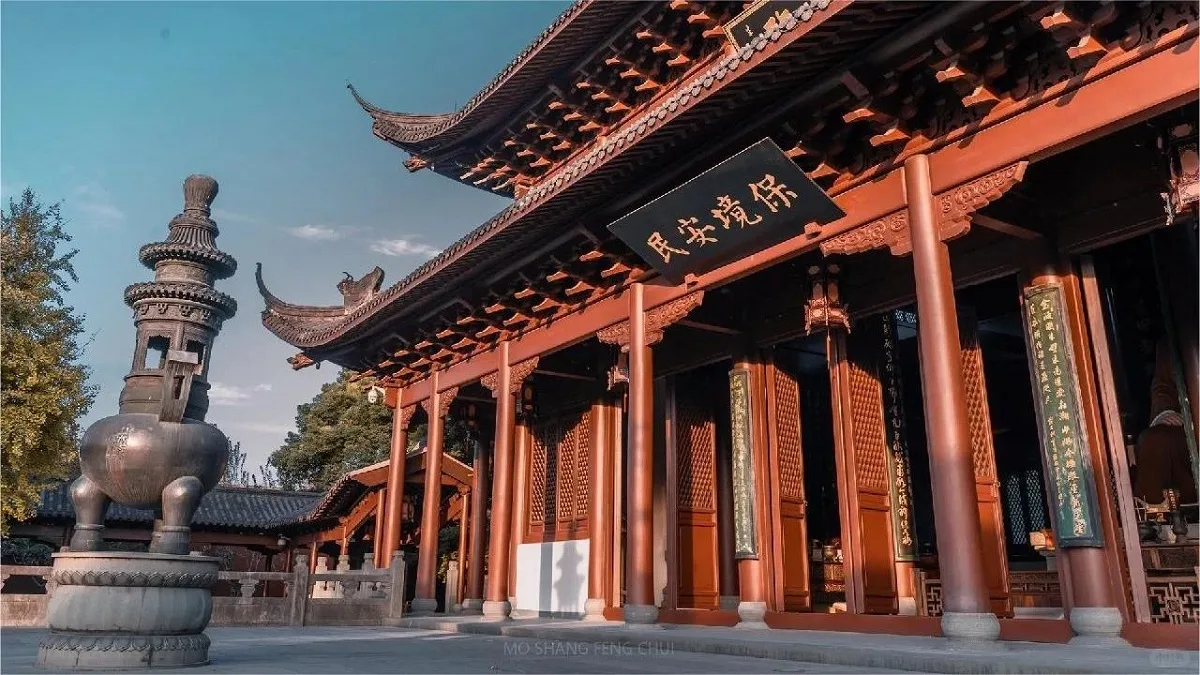Qian Wang Temple (钱王祠), also known as Emperor Qian Temple, is situated south of the Golden Stream in West Lake, facing Yue Temple across the lake. Originally named “Biaozhong Temple” in the early Song Dynasty, it became commonly known as Qian Wang Temple during the Qing Dynasty. The temple has a history of over 900 years and enshrines the five kings of the Qian family who ruled the Wu Yue Kingdom for three generations. Within the temple, visitors can see statues of the Qian kings, the Gongde Chongfang Archway, and various main halls. Additionally, there is an ancient stage where performances of “The Legend of Qian Liu” and other traditional operas like Kunqu, Peking Opera, and Yue Opera are staged for visitors to enjoy. During the blooming season from February to March, the red walls and grey tiles of the temple are complemented by the beauty of several plum blossoms, creating a charming and picturesque scene.
Table of Contents
- Basic Information
- Location and Transportation
- Highlights of Qian Wang Temple
- Vlog about Qian Wang Temple
- Attractions near Qian Wang Temple
Basic Information
| Estimated Length of Tour | 0.5 – 1 hour |
| Ticket Price | 15 RMB |
| Opening Hours | 8.00 -16.30; Last admission: 16.00 |
| Telephone Number | 0086-0571-87077321 |
Location and Transportation
Qian Wang Temple is situated on the eastern bank of West Lake, within the Linyin Park. The precise address is 11 Nanshan Road, Shangcheng District, Hangzhou, Zhejiang Province, China. To get there, you can choose one of the following ways:
Bus: Take bus 12, 31, 38, 42, 102, West Lake Inner Ring Line, or West Lake Outer Ring Line and get off at Qianwangci Stop (钱王祠站).
Metro: The closest metro station to Qian Wang Temple is Wushan Square (吴山广场) on line 7. After getting out the station from the west exit, walk about 450 meters to the northwest to reach the temple.
Highlights of Qian Wang Temple
Bronze Offering Hall (铜献殿)

The first reconstructed hall in Qian Wang Temple, the Bronze Offering Hall, was designed by the renowned Chinese craftsman and copper art artist Zhu Bingren. This hall, featuring a single-story triple-eave structure in the style of the Song Dynasty, is adorned with a stupa-shaped copper roof weighing over 40 tons. Its structure and design are distinctive, characterized by an ancient brass color that exudes elegance and grandeur. Despite its relatively modest size, with a height of 8.4 meters and dimensions of 4 meters by 4 meters, the Bronze Offering Hall boasts the largest copper base area for a temple in China, measuring 100 square meters.
Hall of Five Kings (五王殿)

The most magnificent and imposing structure in the reconstructed Qian Wang Temple is undoubtedly the Hall of Five Kings. This hall houses statues of the five kings of the Qian family who ruled the Wu Yue Kingdom for three generations. At the center of the hall stands a towering statue of Qian Liu, approximately 5 meters tall, surrounded by lifelike statues of Qian Yuanguan, Qian Hongzuo, Qian Hongcong, and Qian Hongchu. The solemn atmosphere within the hall evokes feelings of reverence and admiration. Additionally, the hall features two side halls, Distant Hall and Huai Zhen Hall, facing each other, adorned with depictions of the Azure Dragon, White Tiger, Vermilion Bird, and Black Tortoise (Four Ancient Spirits in Chinese folklores) on their walls.
Ancient Stele (古碑)

A notable artifact within the temple is the ancient stele inscribed with “The Record of Loyalty at Biaozhong Temple (表忠观碑记),” authored by the renowned Chinese scholar Su Shi. This inscription, considered a masterpiece in Chinese calligraphy history, recounts the deeds of the Qian kings during the turbulent Five Dynasties period. It praises their loyalty to the central government, their efforts to pacify conflicts, and their ultimate allegiance to the Song Dynasty. While the original stele no longer exists, a precious replica from the Jiajing period of the Ming Dynasty is preserved within Qian Wang Temple, serving as a testament to its historical significance.





